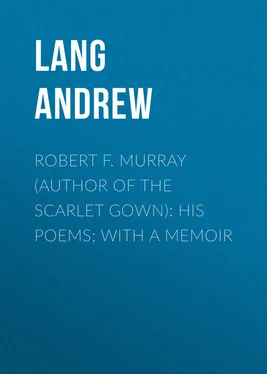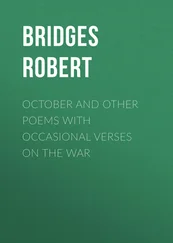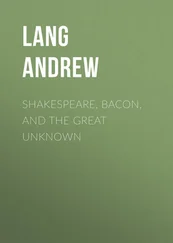Andrew Lang - Robert F. Murray (Author of the Scarlet Gown) - His Poems; with a Memoir
Здесь есть возможность читать онлайн «Andrew Lang - Robert F. Murray (Author of the Scarlet Gown) - His Poems; with a Memoir» — ознакомительный отрывок электронной книги совершенно бесплатно, а после прочтения отрывка купить полную версию. В некоторых случаях можно слушать аудио, скачать через торрент в формате fb2 и присутствует краткое содержание. Жанр: foreign_antique, foreign_prose, на английском языке. Описание произведения, (предисловие) а так же отзывы посетителей доступны на портале библиотеки ЛибКат.
- Название:Robert F. Murray (Author of the Scarlet Gown): His Poems; with a Memoir
- Автор:
- Жанр:
- Год:неизвестен
- ISBN:нет данных
- Рейтинг книги:4 / 5. Голосов: 1
-
Избранное:Добавить в избранное
- Отзывы:
-
Ваша оценка:
- 80
- 1
- 2
- 3
- 4
- 5
Robert F. Murray (Author of the Scarlet Gown): His Poems; with a Memoir: краткое содержание, описание и аннотация
Предлагаем к чтению аннотацию, описание, краткое содержание или предисловие (зависит от того, что написал сам автор книги «Robert F. Murray (Author of the Scarlet Gown): His Poems; with a Memoir»). Если вы не нашли необходимую информацию о книге — напишите в комментариях, мы постараемся отыскать её.
Robert F. Murray (Author of the Scarlet Gown): His Poems; with a Memoir — читать онлайн ознакомительный отрывок
Ниже представлен текст книги, разбитый по страницам. Система сохранения места последней прочитанной страницы, позволяет с удобством читать онлайн бесплатно книгу «Robert F. Murray (Author of the Scarlet Gown): His Poems; with a Memoir», без необходимости каждый раз заново искать на чём Вы остановились. Поставьте закладку, и сможете в любой момент перейти на страницу, на которой закончили чтение.
Интервал:
Закладка:
THE WASTER SINGING AT MIDNIGHT.
AFTER LONGFELLOW
Loud he sang the song Ta Phershon
For his personal diversion,
Sang the chorus U-pi-dee,
Sang about the Barley Bree.
In that hour when all is quiet
Sang he songs of noise and riot,
In a voice so loud and queer
That I wakened up to hear.
Songs that distantly resembled
Those one hears from men assembled
In the old Cross Keys Hotel,
Only sung not half so well.
For the time of this ecstatic
Amateur was most erratic,
And he only hit the key
Once in every melody.
If “he wot prigs wot isn’t his’n
Ven he’s cotched is sent to prison,”
He who murders sleep might well
Adorn a solitary cell.
But, if no obliging peeler
Will arrest this midnight squealer,
My own peculiar arm of might
Must undertake the job to-night.
The following fragment is but doubtfully autobiographical. ‘The swift four-wheeler’ seldom devastates the streets where, of old, the Archbishop’s jackmen sliced Presbyterian professors with the claymore, as James Melville tells us: —
TO NUMBER 27x
Beloved Peeler! friend and guide
And guard of many a midnight reeler,
None worthier, though the world is wide,
Beloved Peeler.
Thou from before the swift four-wheeler
Didst pluck me, and didst thrust aside
A strongly built provision-dealer
Who menaced me with blows, and cried
‘Come on! come on!’ O Paian, Healer,
Then but for thee I must have died,
Beloved Peeler!
The following presentiment, though he was no ‘waster,’ may very well have been his own. He was only half Scotch, and not at all metaphysical: —
THE WASTER’S PRESENTIMENT
I shall be spun. There is a voice within
Which tells me plainly I am all undone;
For though I toil not, neither do I spin,
I shall be spun.
April approaches. I have not begun
Schwegler or Mackintosh, nor will begin
Those lucid works till April 21.
So my degree I do not hope to win,
For not by ways like mine degrees are won;
And though, to please my uncle, I go in,
I shall be spun.
Here we must quote, from The Scarlet Gown , one of his most tender pieces of affectionate praise bestowed on his favourite city: —
A DECEMBER DAY
Blue, blue is the sea to-day,
Warmly the light
Sleeps on St. Andrews Bay —
Blue, fringed with white.
That’s no December sky!
Surely ’tis June
Holds now her state on high,
Queen of the noon.
Only the tree-tops bare
Crowning the hill,
Clear-cut in perfect air,
Warn us that still
Winter, the aged chief,
Mighty in power,
Exiles the tender leaf,
Exiles the flower.
Is there a heart to-day,
A heart that grieves
For flowers that fade away,
For fallen leaves?
Oh, not in leaves or flowers
Endures the charm
That clothes those naked towers
With love-light warm.
O dear St. Andrews Bay,
Winter or Spring
Gives not nor takes away
Memories that cling
All round thy girdling reefs,
That walk thy shore,
Memories of joys and griefs
Ours evermore.
‘I have not worked for my classes this session,’ he writes (1884), ‘and shall not take any places.’ The five or six most distinguished pupils used, at least in my time, to receive prize-books decorated with the University’s arms. These prize-men, no doubt, held the ‘places’ alluded to by Murray. If he was idle, ‘I speak of him but brotherly,’ having never held any ‘place’ but that of second to Mr. Wallace, now Professor of Moral Philosophy at Oxford, in the Greek Class (Mr. Sellar’s). Why was one so idle, in Latin (Mr. Shairp), in Morals (Mr. Ferrier), in Logic (Mr. Veitch)? but Logic was unintelligible.
‘I must confess,’ remarks Murray, in a similar spirit of pensive regret, ‘that I have not had any ambition to distinguish myself either in Knight’s (Moral Philosophy) or in Butler’s.’ 1 1 Mr. Butler lectures on Physics, or, as it is called in Scotland, Natural Philosophy.
Murray then speaks with some acrimony about earnest students, whose motive, he thinks, is a small ambition. But surely a man may be fond of metaphysics for the sweet sake of Queen Entelechy, and, moreover, these students looked forward to days in which real work would bear fruit.
‘You must grind up the opinions of Plato, Aristotle, and a lot of other men, concerning things about which they knew nothing, and we know nothing, taking these opinions at second or third hand, and never looking into the works of these men; for to a man who wants to take a place, there is no time for anything of that sort.’
Why not? The philosophers ought to be read in their own language, as they are now read. The remarks on the most fairy of philosophers – Plato; on the greatest of all minds, that of Aristotle, are boyish. Again ‘I speak but brotherly,’ remembering an old St. Leonard’s essay in which Virgil was called ‘the furtive Mantuan,’ and another, devoted to ridicule of Euripides. But Plato and Aristotle we never blasphemed.
Murray adds that he thinks, next year, of taking the highest Greek Class, and English Literature. In the latter, under Mr. Baynes, he took the first place, which he mentions casually to Mrs. Murray about a year after date: —
‘A sweet life and an idle
He lives from year to year,
Unknowing bit or bridle,
There are no Proctors here.’
In Greek, despite his enthusiastic admiration of the professor, Mr. Campbell, he did not much enjoy himself: —
‘Thrice happy are those
Who ne’er heard of Greek Prose —
Or Greek Poetry either, as far as that goes;
For Liddell and Scott
Shall cumber them not,
Nor Sargent nor Sidgwick shall break their repose.
But I, late at night,
By the very bad light
Of very bad gas, must painfully write
Some stuff that a Greek
With his delicate cheek
Would smile at as ‘barbarous’ – faith, he well might.
So away with Greek Prose,
The source of my woes!
(This metre’s too tough, I must draw to a close.)
May Sargent be drowned
In the ocean profound,
And Sidgwick be food for the carrion crows!’
Greek prose is a stubborn thing, and the biographer remembers being told that his was ‘the best, with the worst mistakes’; also frequently by Mr. Sellar, that it was ‘bald.’ But Greek prose is splendid practice, and no less good practice is Greek and Latin verse. These exercises, so much sneered at, are the Dwellers on the Threshold of the life of letters. They are haunting forms of fear, but they have to be wrestled with, like the Angel (to change the figure), till they bless you, and make words become, in your hands, like the clay of the modeller. Could we write Greek like Mr. Jebb, we would never write anything else.
Конец ознакомительного фрагмента.
Текст предоставлен ООО «ЛитРес».
Читать дальшеИнтервал:
Закладка:
Похожие книги на «Robert F. Murray (Author of the Scarlet Gown): His Poems; with a Memoir»
Представляем Вашему вниманию похожие книги на «Robert F. Murray (Author of the Scarlet Gown): His Poems; with a Memoir» списком для выбора. Мы отобрали схожую по названию и смыслу литературу в надежде предоставить читателям больше вариантов отыскать новые, интересные, ещё непрочитанные произведения.
Обсуждение, отзывы о книге «Robert F. Murray (Author of the Scarlet Gown): His Poems; with a Memoir» и просто собственные мнения читателей. Оставьте ваши комментарии, напишите, что Вы думаете о произведении, его смысле или главных героях. Укажите что конкретно понравилось, а что нет, и почему Вы так считаете.












